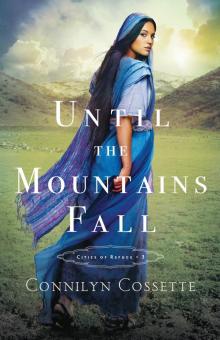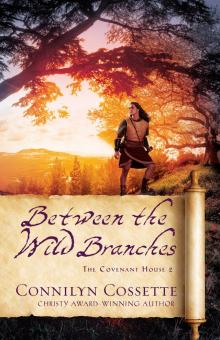- Home
- Connilyn Cossette
Shelter of the Most High Page 14
Shelter of the Most High Read online
Page 14
After a swift, curious look divided between me, the partially open door to the inn, and the shepherd who was quickly melting into the swirling crowd near the gates, Nadir waved a dismissive hand at me as he began to move toward the broken wagon. “I’ll see to it. Go. Make sure Moriyah is safe.”
Ensuring the door was latched tight behind me, I headed through the shuttered main room and out into the bright courtyard. Cool relief trickled into my limbs as I saw my mother at her usual place in front of her stone oven, unharmed. On the heels of relief, however, was jagged alarm. Even after seeing the man who’d vowed to slay her in the olive grove that day, she seemed all too complacent over the threat he posed. At the very least, the door to the inn should not be an open invitation to spies—or worse. How could I ensure that my mother would remember how vulnerable she truly was, even within the stone walls of Kedesh?
A scheme formed in my mind as she stood with her hands on her hips, a flat spatula gripped in one fist, staring into the coals as if she were chastising the bread for cooking too slowly. Lost in thought, she did not notice as I made my way toward her.
Binah and Sarai spotted me and looked up from where they sat cross-legged in the shade of the roof overhang, chopping vegetables. But when I placed a finger in front of my lips, they grinned, well-acquainted with my antics, and said nothing as they shook their heads and continued their work.
Rolling my feet to keep my steps silent, I came up behind my mother and threw my arms around her from behind, gripping her against my chest as she flailed, arms trapped by the unexpected embrace. I squeezed a bit tighter, ensuring she would not have the luxury of knowing who her attacker was. To my satisfaction, she bucked against me, fighting with surprising strength and insisting she be set free.
With a low laugh, I obeyed.
She spun on me, silver eyes on fire, and smacked my shoulder hard with her spatula. “Eitan! What are you doing?” Anticipating the second slap of her weapon, I dodged to the side and lifted my palms in surrender.
“You nearly made my heart stop beating!” With a glare, she moved to retrieve the flatbread loaves that had curled away from the sides of the oven before they burned on the coals.
“My apologies for startling you.” I glanced back toward the door, wondering how long that shepherd had been standing there with his eyes on my mother’s inn. “But you must be more aware of your surroundings. Even here.”
“What do you mean?” She must have sensed the gravity in my statement. Her anger seemed to dissolve as she brushed soot from the brown-dappled rounds and placed them into a linen-lined basket. The steamy smell of the fresh bread made my neglected stomach grumble loudly, so she handed me a piece.
Impatient, I tore it in two and shoved one half into my mouth as if I were Malakhi, nearly moaning as its salty warmth delighted my senses. No one made bread like my ima. Reluctantly swallowing, I continued. “Have you seen a man hanging around the inn? A young shepherd, dark hair and eyes?”
She looked up at me over her shoulder. “Not that I know of, but there are so many people streaming in and out of Kedesh these days.”
I pursed my lips, glancing back to ensure Binah and Sarai were out of earshot. “I have. I noticed him watching me twice before, and just now I caught him peering through the front door, which had been left open.”
“The girls went next door a while ago to play with Surit’s children. They must not have latched it.” Concern pinched her black brows into a tight line as she set the bread basket on the table. “A guest, perhaps?”
I shook my head. “He sped off the moment he saw me. I have a feeling Raviv may have sent him.”
Her hand flew to her chest as she caught her breath. “Have you told Darek and Baz?”
“Not yet. But I will. We must be more diligent, Ima. I should have taken Darek’s warning about Raviv’s tenacity more seriously.” I braced my hands on my hips, unease settling into my bones. “I will do whatever is necessary to protect you.”
“Of course you will.” She slid her arms around my waist and hugged me tightly. I noticed that her head now fit underneath my chin, smiling as I remembered it being the other way around not so long ago. Moriyah had been a light in my dark world as a boy, and it made me ill to think that Raviv might have sent someone to watch her—or worse, to hurt her.
She looked up at me. “But you must remember, Eitan, it is Yahweh who creates life and Yahweh who maintains it. Your efforts, and Darek’s, can only go so far to preserve me from harm. I trust the God who rescued our people from Egypt, the God who brought us through the sea, and the God who shook Jericho to its foundations to protect me.”
I admired her unswerving faith. I’d hoped that by consecrating myself body and soul as a Nazirite Yahweh might be pleased, but somehow shame continued to gnaw at me, along with the memory of two boys vomiting blood and bile and poison into the dirt.
She loosened her hold but kept her arms looped around my waist. “Have you spoken with Sofea about marriage yet?”
Startled by the question, I simply stared at her. I’d not revealed my intentions toward Sofea to my mother, but I should have known she’d guessed my thoughts. Not much escaped her notice.
“Eitan, you are anything but subtle.” She breathed a laugh. “You’ve been panting after that girl since she walked in our door.”
Heat rushed up my neck. To cover the evidence of my embarrassment, I hooked my hand around my nape. “I have tried to be patient.”
She patted my chest knowingly. “I know you have. You’ve done well to not pursue her until now. Healing does not happen overnight.” She glanced up and tilted her head toward the stairway to the roof. “Now that she knows about Kedesh and about me, she has some decisions to make. Prezi said she’s recovered a bit from the shock, but she’s been up there all morning by herself. Perhaps you should join her, offer to answer any questions she might have?” She leaned in, sniffed, and made a sour face. “After you’ve washed.”
“Do you think she will . . .” I cleared my throat. “Accept me?”
“I think she still has some healing to do, son. And she has much to learn of Yahweh. But you?” Her smile was pure mischief. “I have little doubt that she is well on her way to accepting you.”
With a grin, I gave her a peck on the cheek and spun away, heading toward my chamber, a pot of water for washing, and my clean tunic. Anxiety, elation, trepidation, and desire stewed in the pit of my stomach. Today I would make my intentions known to Sofea, hoping that when I finally poured out the contents of my past she would not turn away the heart of a killer.
CHAPTER
NINETEEN
Sofea
I felt his presence long before he came to my side but continued watching a swirling black flock of birds dance across the sky in awe-inspiring formations over the valley. The living cloud moved like a wave in the air, rolling up and down, swooping high, stretching wide, before curling in on itself and rearranging into a new pattern, an ever-flowing tide of tiny winged creatures chasing with the wind.
“What are these?” I asked, offering him an invitation to approach. How long had he been standing here on the rooftop, watching me? Although the thought should make me cringe, should make me flee, in truth I’d wondered what had taken him so long to come.
“Starlings.” The low answer directly behind me made the blood thrum in my ears. He was almost as close as he’d been last night, but this time there were no shadows to hide the flush of my cheeks.
“Where do they come from?”
“I don’t know. But I remember . . .” He cocked his head and peered into the sky, as if searching his memory. “I remember my mother telling me about starlings—how they would swirl in the sky like ink on water, when our people still wandered the wilderness far to the south of here.” He paused, gazing in that direction with a faraway look in his eyes. “Perhaps they are on their way now to those deserts to wait out the colder weather.”
“Moriyah told you this?”
“No.”
He turned with a sad smile. “It is one of the few memories I have left of the woman who gave birth to me. Her name was Abra.”
“Like your sister?”
“Moriyah and Darek allowed me to name my sister when she and Malakhi were born. I didn’t have anything left of my mother, other than those few cloudy memories, so I gave her name to Abra. To honor her life and keep a small part of her with me.”
We went silent, listening to the song of the flock as they continued their enthralling dance in the sky until without warning the birds sped away as a unit, heading toward the southern horizon.
“Sofea.” He cleared his throat. “I know that you are aware now of where you live. Of what Kedesh is and why my mother is here.”
I nodded but kept my lips sealed. I’d spent hours here on the roof digesting all that Moriyah and Prezi had told me. Although still more than unsettled with the idea that I lived in a prison, I was forced to acknowledge that I felt safer in this city, surrounded by killers, than I ever had with my own father.
Prezi was right. He’d been nothing but a murderer. It was common knowledge that to stand against him meant death, and I’d seen more than one man gutted for doing so—it was a miracle that my mother had survived standing up for Seno’s life that day. The longer I’d stayed up here, the higher the rot of his deeds piled in my mind. And knowing how I’d excused those actions all my life, attributing them to his divine right as the chief and high priest, how could I possibly condemn someone like Moriyah? Although I was still annoyed at my cousin for hiding the truth from me for so long, my initial overheated reaction had tempered into mild acceptance.
“There is more you need to know,” he said. Something about the way he spoke the words made my insides swirl like that cloud of starlings. “About me. About how I came to be Moriyah’s son. About why I live in Kedesh.”
He breathed out a long sigh, the sound of a man releasing the knot on a long-held secret. “As you know, my parents died when I was five. The only relative willing to take me on was my mother’s half-brother. He was quite a bit older than her, and there were eight years between me and the youngest of his six sons.” He stopped. Winced before continuing. “Although he took me into his home, I was treated more like a dog than a child. I lived on whatever was left after the family had eaten. I inherited tunics that had been used by each of the sons, worn until near unraveling. My uncle didn’t hit me—in fact, at times I’d probably have preferred that he did—he just didn’t care. And his wife was too harried by the enormous task of raising six unruly sons to concern herself with one small orphan. I imagine they didn’t even expect me to live long, since my father and mother had been swept away so easily by illness.”
I was speechless. I could not imagine this tall, vibrant man being so wholly ignored by his relatives. Everything about Eitan demanded attention. His long, slender body honed by grueling work and training. His animated laugh and the way humor danced in his hazel eyes as he interacted with his loved ones and covertly watched me during mealtimes. The high, masculine cut of his cheekbones. The thick outline of his black eyelashes. His deeply freckled skin. Even the long dark hair that hung down, damp and wavy, about his strong shoulders. No matter that I’d fought it since that first night, I’d always been aware of him, ever attuned to his presence in any room. Nothing about Eitan should ever be ignored.
“But strangely enough, it was their neglect, their disregard for my health and well-being that ended up being my salvation.” He turned around and leaned against the stone wall, half facing me. “I spent those years wandering all over Shiloh, looking for food. Entertaining myself. Exploring the hills and climbing trees.”
“You have no children to play with?”
He shrugged a shoulder. “A few, but many of them shunned me because of my ear.”
I furrowed my brow, confused by his statement. “Ear?”
“Have you not noticed that I only hear on my left side?”
I shook my head, surprised that I had missed such a thing since I spent too much time studying him whenever he was not looking.
He shifted around and lifted the dark curtain of his hair away from his right ear. The outer ear was misshapen, completely curled in on itself and without an opening to let in sound. No wonder he kept his hair tied very low on his neck; its thickness hid the deformity well. Remembering some of the unkind children in my own village, I imagined Eitan had been taunted for such an obvious difference in his appearance.
“You not hear with it?”
Dropping his hair, he turned his left side to me with confusion on his brow.
“This is difficult? Hearing me?”
“I was born this way, so I’ve learned to adapt. My left ear picks up sound very well, as if making up for the loss. And I watch lips.” As if to prove his point, his gaze dropped to my mouth, making me acutely conscious of the attention.
He seemed to be waiting for me to speak, his eyes targeting my lips like an arrow from a bow. I held still, refusing to so much as breathe until he finally glanced up with a confident little smirk. He knows the effect he has on me.
Slouching back against the wall, with his good ear toward me, he continued his story. “It was on one of those lonely, friendless days that Moriyah’s father, Ishai, found me with my mouth stuffed full of his grapes. I’d snuck into his vineyard a few times before, always keeping out of sight of the watchtower guard, but this time Ishai caught me. Instead of running me off, like most vintners would do to a thief, he put me to work scaring off the birds from his crops. Sometimes he even let me stomp the grapes at harvest. Of course you can imagine that I was overjoyed to be paid in food from Moriyah’s kitchen.”
I returned his mischievous smile. “No one goes hungry at her table.”
“This is true, and I adored her for it. There was nothing I wouldn’t do for her.” His brow furrowed. “There were people in Shiloh who treated her poorly for the brand on her face, so I took it on myself to be her defender.” A boy who endured such torment for his ear would undoubtedly be highly protective of someone he so admired.
He dropped his chin, looking at the plastered roof under his feet. “It is for that very reason that I killed those boys.”
Blood rushed in my ears, and I blinked at him in confusion.
“It was me. I was the one who plucked the oleander that day, not understanding its true nature. I noticed that Moriyah had accidentally sliced the deadly stems along with her herbs while distracted by Raviv’s malicious sons. I placed the poison into the stew when she told me to stir the herbs into the pot. Although I thought it would only make the boys get sick and stop taunting her, I still wanted to see them suffer. Wanted to see them vomit and writhe after the awful things they said to her.”
Although I should have been horrified by the admission, as much as I had been when Moriyah told me the truth of this place last night, instead empathy for Eitan welled in my chest, along with a feeling of acute frustration. He did not understand my heart language, and my Hebrew words were so inadequate. What could I say to this man who clearly was still suffering from a grievous mistake he’d made as a child? He’d comforted me in the olive grove, and I desperately wished I could respond in kind.
“For her part in the deaths, Moriyah was sentenced to live in Kedesh, and it was then that she adopted me as her child. She is as much my mother as the woman who gave birth to me, yet I am the reason she cannot go past that boundary line without being hunted.” Choking on the last words, he whispered something under his breath and then threaded his fingers behind his neck and bowed at the waist, as if standing were painful.
Helplessly I watched as Eitan slid down the wall, the weight of such admissions dragging him to the ground. Feeling the pull to do something—anything—to lessen his pain, I folded my legs and settled beside him, offering the only gifts I had: patience and silence. Another small flock of birds passed overhead, long-legged white egrets on their way to Nadir’s sparkling lake nearby.
“I stayed,” he continue
d, his tone dark and tortured as he kept his head down, his hair hiding whatever bleak expression was surely on his face. “My mother does not know this, but I did not run off after poisoning that stew. I hid around the corner of the house, not trusting that even with sick bellies those boys wouldn’t keep calling her names. I watched Zeev and Yared eat that stew, rejoiced when they demanded another bowl from her, and then when one of them began to vomit and moan I felt victory in my blood. I felt like a warrior.”
I could practically see him, all legs and spindly arms folded into the shadows like a tattered little spirit of the night, watching the effects of his ill-fated actions.
“Then one of them began to cough up blood. He cried out that he couldn’t see, and the other one was affected in the same way soon after their father arrived. I watched as Raviv held one dying son on his lap while the other collapsed, blind, bloody, and convulsing next to him in the firelight.”
I could not move, my body had gone as rigid as that little boy in the dark must have as the horror of that night unfolded in front of him.
“It wasn’t until both boys were dead, until Raviv began bellowing for Moriyah’s blood, that I ran. I ran until my feet were shredded from the rocks, until I was completely surrounded by darkness and could not see a hand in front of my face. I don’t even remember curling up in the dirt at the foot of a fig tree or waking the next morning. It was three days before my howling belly forced me to slink back to my uncle’s house.” He shook his head with a humorless laugh but didn’t look up. “They didn’t even notice I’d been gone.”
In my desperation to soothe him, I placed my hand on his knee, a paltry attempt at comfort offered without much forethought. My heart thudded in my chest as I realized that I was touching him without invitation. But just as I reconsidered and began to remove my hand, he caught it in his callused one, grasping it tightly. Then his other palm curved around it as well, and he threaded his fingers through mine, braiding our hands together securely. The grip he maintained on my hand reminded me of the way Prezi had clung to me in the sea to keep her head from slipping underwater as her body was thrashed against the rocks. Eitan held on to me as if I alone were keeping him from drowning. And I welcomed it.

 Until the Mountains Fall
Until the Mountains Fall Between the Wild Branches
Between the Wild Branches To Dwell among Cedars
To Dwell among Cedars Counted With the Stars
Counted With the Stars Shelter of the Most High
Shelter of the Most High Shadow of the Storm
Shadow of the Storm A Light on the Hill
A Light on the Hill Wings of the Wind
Wings of the Wind